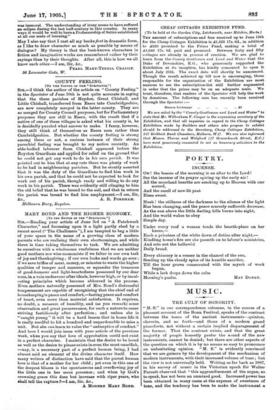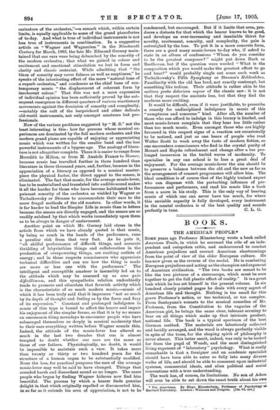caricature of the orchestra,"—a remark which, within certain limits, is
equally applicable to some of the grand pianofortes of to-day. And what is true of individual instruments is not less true of instruments in combination. In a suggestive article on " Wagner and Wagnerism " in the Nineteenth Century for March, 1883, the late Mr. Edmund Gurney main- tained that our ears were being debauched by the sonority of the modern orchestra ; that what we gained in colour and excitement and emotional stimulation we lost in form and clarity and classic restraint. While admitting that " the blaze of sonority may cover fulness as well as emptiness," he speaks of the intoxicating effect of the mere "natural tone of a superb orchestra," and condemns as the chief bane of con- temporary music " the displacement of coherent form by incoherent colour." That this was not a mere expression of individual opinion has been sufficiently proved by the sub- sequent emergence in different quarters of various reactionary movements against the dominion of sonority and complexity, —notably the cult of the harpsichord and other delicate old-world instruments, not only amongst amateurs but pro- fessionals.
Now of the various problems suggested by " M. S." not the least interesting is this: how far persons whose musical ex- periences are dominated by the full modern orchestra and the modern grand piano are capable of enjoying or appreciating music which was written for the smaller band and the less powerful instruments of a bygone age. The analogy of litera- ture is not altogether complete. There it is easier to range from Meredith to Milton, or from M. Anatole France to Homer, because music has travelled further in three hundred than literature in three thousand years, and, further, because in the appreciation of a literary as opposed to a musical master- piece the physical factor, the direct appeal to the senses, is eliminated. The fact that music, for the average music-lover, has to be materialised and translated into audible sound makes it all the harder for those who have become habituated to the puissant sonority of the orchestra as wielded by Wagner or Tschaikowsky or Strauss to accommodate their ears to the more frugal methods of the old masters. In other words, it is far harder to lead the Simpler Life in music than in letters because the senses are directly engaged, and the senses are so readily subdued by that which works immediately upon them as to be always in danger of enslavement.
Another point on which Mr. Gurney laid stress in the article from which we have already quoted is that music, by being so much in the hands of the performers, runs a peculiar risk from that very fact. As he puts it, "all skilful performance of difficult things, and accurate thridding of labyrinthine things and collaboration in the production of overpowering things, are exciting outlets of energy; and in these respects connoisseurs who appreciate technical difficulties and can see how the thing is made are more or less one with the performers." The intelligent and susceptible amateur is insensibly led on to the attitude which may be summed up as amo quia difficillimum, and this sympathetic relation undoubtedly tends to promote and stimulate that feverish activity which is the characteristic of so much modern music,—music of which it has been truly said that it impresses "not so much by its depth of thought and feeling as by the force and fury of its expression." Constant and prolonged indulgence in music of this type is bound to affect the hearer and impair his enjoyment of the simpler forms, so that it is by no means an uncommon thing nowadays to encounter people who have submerged themselves so deeply in musical modernity that to their ears everything written before Wagner sounds thin. Indeed, the attitude of the music-lover has altered so much in the last two decades that one is almost tempted to doubt whether our ears are the same as those of our fathers. Physiologically, no doubt, it would be impossible to maintain such a view. It takes more than twenty or thirty or two hundred years for the structure of a human organ to be substantially modified. None the less, for practical purposes the ears of the average music-lover may well be said to have changed. Things that sounded harsh and discordant sound so no longer. The same people who began by finding Wagner hideous now find him beautiful. The process by which a hearer finds genuine delight in that which originally repelled or disconcerted him, in so far as it extends his area of appreciation, is not to be condemned, but encouraged. But if it limits that area, pro- duces a distaste for that which the hearer knows to be good, and develops an ever-increasing and insatiable thirst for novelty, excitement, sonority, and complexity, the gain is outweighed by the loss. To put it in a more concrete form, there are a good many music-lovers to-day who, if asked to state in an album of confessions " Whom do you consider to be the greatest composer? " might put down Bach or Beethoven, but if the question were worded " What is the composition which you would make the greatest effort to go and hear?" would probably single out some such work as Tschaikowsky's Fifth Symphony or Strauss's Heldenleben. Familiarity with the old has bred, not exactly contempt, but something like tedium. Their attitude is rather akin to the meliora probo deteriora sequor of the classic saw: it is not that they respect the ancients less, but that they find the moderns more exciting.
It would be difficult, even if it were justifiable, to prescribe a remedy for undisciplined indulgence in music of this "sumptuous and sonorous" kind. After all, the number of those who can afford to indulge in this luxury is limited, and most music-lovers complain that they hear too little rather than too much music. Even amongst those who are highly favoured in this respect signs of a reaction are occasionally to be noticed, and just as one hears of people who read Walter Scott to wash away the taste of modern fiction, so one encounters connoisseurs who find in the crystal purity of Mozart and Haydn refreshment and change after a too pro- longed immersion in the turbid waves of modernity. To specialise in any one school is to lose a great deal of enjoyment. For the average music-lover the aim should be to preserve a balance between the old and the new as far as the arrangement of concert programmes will allow him. The ideal condition is of course that of the highly trained expert who can dispense with the perturbing influence of per- formances and performers, and read his music like a book from a score in his study. This is the only way of hearing music of which one can never have too much, for where this enviable capacity is fully developed, every instrument in the mental orchestra is of the best quality and sounds perfectly in tune. C. L. G.







































 Previous page
Previous page